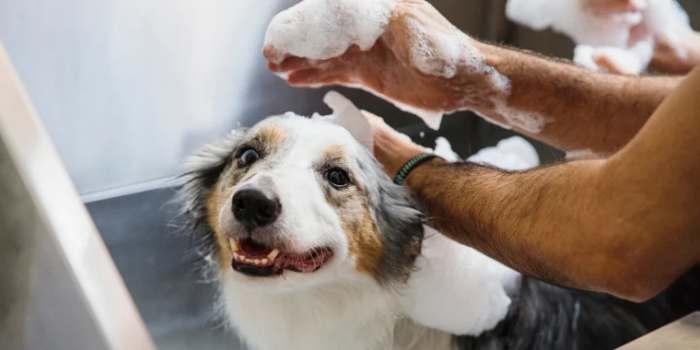Have you ever wondered Is Glycerin Safe for Dogs? It’s a reasonable concern, so let’s take a closer look. From its potential benefits to its potential risks, this article will explore if glycerin is a healthy choice for your pup.
Contemplating the use of glycerin for your pup? Don’t fret – we’ll also provide you with dosage guidelines and alternatives. With the right information, you can make an informed decision that’s best for your pup.
Understanding the Nature of Glycerin in Dog Products:
So, what’s glycerin? But, it’s a by-product of soap-making derived from plant-based oils and is often used to make products such as lotions and moisturizers.
Glycerin isn’t inherently toxic to dogs. However, when using it, it’s important to understand pet safety and toxic levels. The amount of glycerin found in food, medicines, and other products suitable for canine consumption should be safe. But it’s important to follow the instructions on the label for proper use and dosage.

It’s also important to be aware of any other ingredients that may be present in the product containing glycerin, as they may be toxic to pets. If ever unsure, consult with a veterinarian to ensure pet safety.
Benefits of Glycerin: Recognizing the Positive Aspects in Canine Consumption
Building on the previous discussion, let’s take a look at the potential benefits of glycerin for dogs:
- It can be used as a skincare product to help moisturize and soothe dry and irritated skin.
- Glycerin can also be used as a coat conditioner, adding shine and helping to reduce tangles.
- It helps to keep the skin and coat healthy by locking in moisture.
- Glycerin is an effective way to reduce the amount of bacteria and other irritants on the coat.
Overall, glycerin has many beneficial uses for dogs and can help keep their skin and coat healthy. It also helps to protect from environmental irritants.
As with any product, it’s important to consult a veterinarian before using glycerin on your pet.
Potential Risks: Examining Concerns and Risks Associated with Glycerin
While glycerin can provide many benefits for your pup, it’s important to be aware of the potential risks associated with its use. There’s limited research available on the use of glycerin in pets, and the unknown effects of long-term use could be concerning.
If you choose to use glycerin for your pet, it’s important to watch for any unusual side effects. It’s also important to always follow the manufacturer’s instructions, as incorrect use could be hazardous to your pet’s health.
Additionally, always consult your veterinarian before introducing any new product into your pet’s routine to ensure proper pet safety.
Dosage Guidelines: Understanding Safe Levels for Dogs
When determining the appropriate dosage of glycerin for your dog, it’s important to keep a few key factors in mind:
- Consider your dog’s size and weight
- Get advice from your vet
Research pet food ingredients
Follow label instructions
When feeding your pup glycerin, it’s best to check with your vet to ensure that it won’t cause any adverse reactions. Glycerin can be an ingredient in some pet foods, so you should also research the ingredients you’re feeding your dog.
Lastly, always follow the label instructions for dosage. Too much glycerin can cause digestive upset or other problems in your pup, so it’s important to be aware of the risks and proceed with caution.
Alternatives to Glycerin: Exploring Safer Options for Canine Treats and Products
If you’re looking for an alternative to glycerin for your pup, there are a few options to consider.

- Vegetable oil is a pet-safe substitute that can be used as a lubricant or a laxative.
- Coconut oil has many health benefits, including aiding digestion and reducing inflammation.
- Olive oil is also a natural option, containing antioxidants and fatty acids that benefit dogs.
- You can try aloe vera for skin and fur, known for its healing properties.
Alternatively, probiotics can help boost digestive health, while vitamin E can help moisturize skin and fur.
Frequently Asked Questions:
Generally speaking, glycerin is safe for all dogs, provided it is administered according to your veterinarian’s feeding guidelines. However, it is essential to exercise pet safety and consult with your vet first to ensure it is appropriate for your dog’s needs.
If your dog ingests contaminated glycerin, watch out for adverse reactions such as vomiting, diarrhea, lethargy, and loss of appetite. Seek immediate medical attention if any of these symptoms occur.
Are you wondering if glycerin is essential to your pup’s diet? Not necessarily. Dietary needs are best met through a variety of nutritious food sources. So, if your furry friend is eating a balanced diet, glycerin may not be necessary.
It depends on the intended use. It could take a few weeks to see results for dietary use. For skincare, it may take a few days to observe the effects.
Dental care is important for your pet, but did you consider their dietary requirements? Glycerin must be given cautiously – monitor your dog’s reactions and consult your vet.
Conclusion:
Glycerin isn’t necessarily bad for dogs, but it comes with its own risks. Unless you know the dosage and there are no alternative options, it’s best to avoid it altogether.
Glycerin can have serious, even fatal, consequences if given to your pup in too high of a dose. So, if you want to keep your furry friend safe and healthy, it’s best to err on the side of caution and stay away from glycerin!

Hey there, I’m Janet Brooks, a dog-loving student from California. I’m all about helping pups in need, especially those without homes. Me and my awesome friends work together to give shelter and love to stray dogs. Oh, and I also write blogs about dogs to share helpful info.